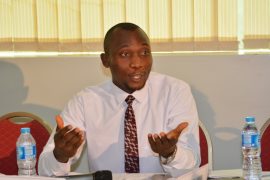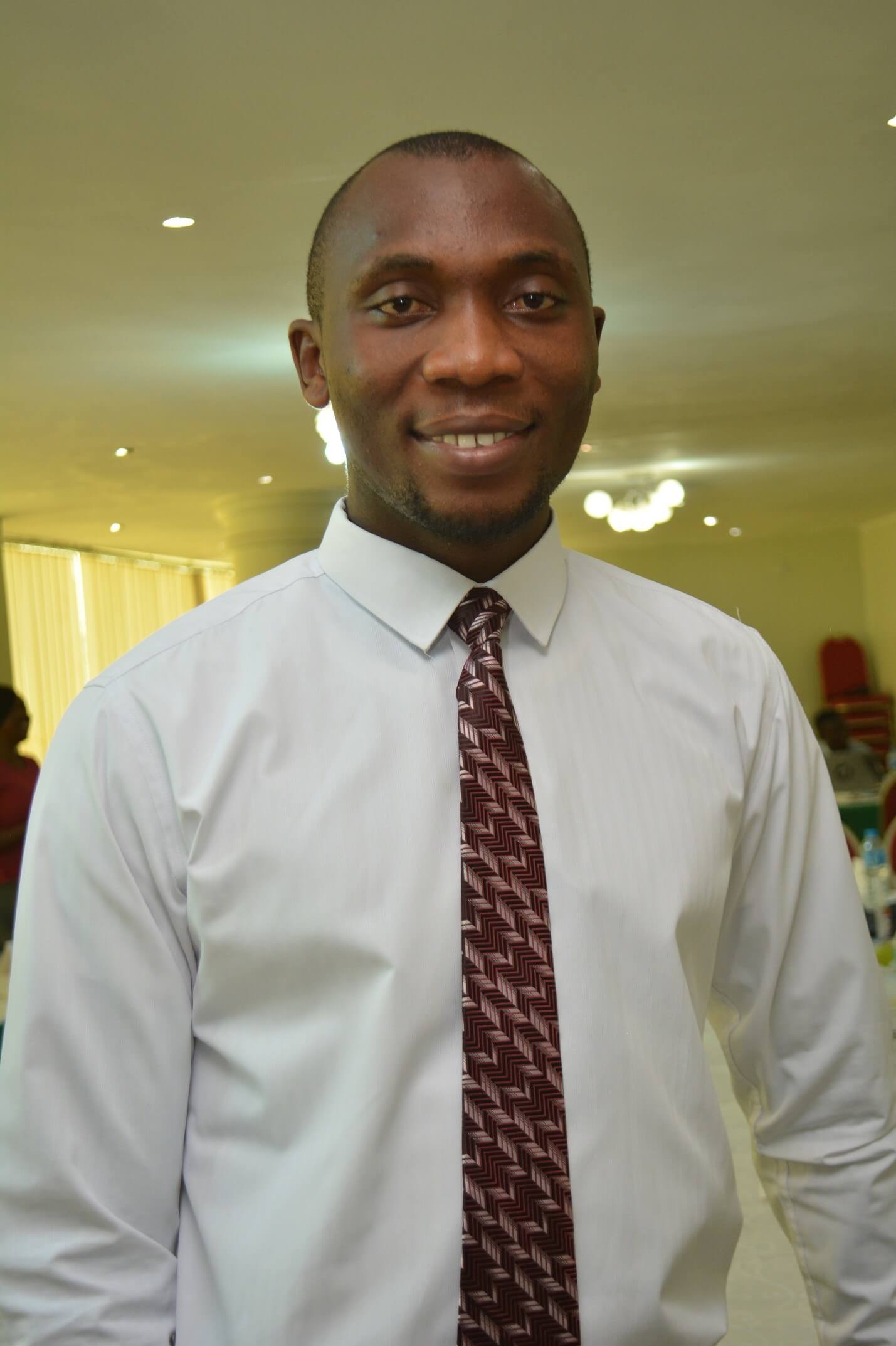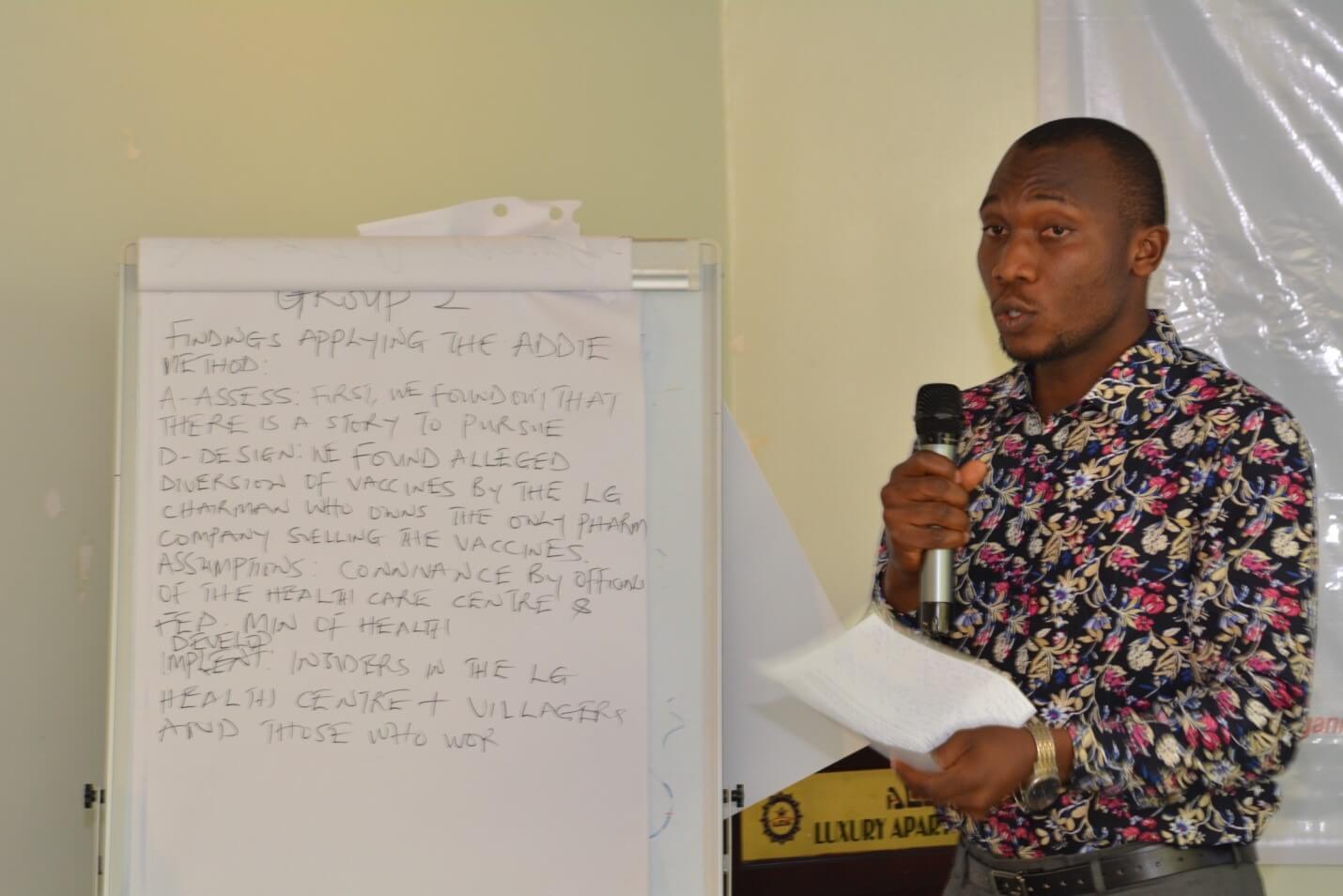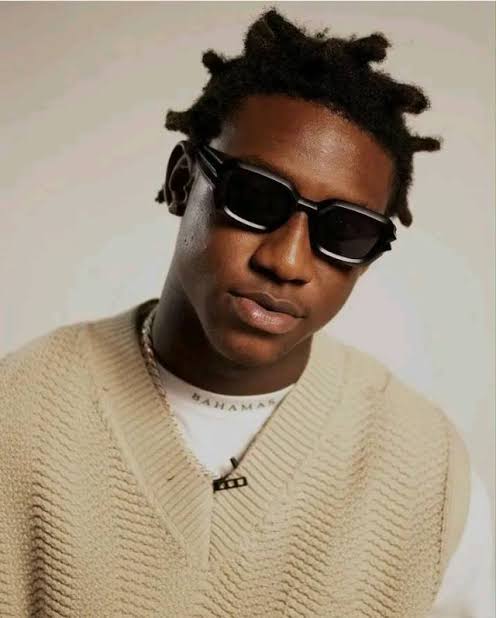Changing the Narrative: How Journalists like Patrick Egwu are fixing Nigeria through Investigative Reports

Patrick Egwu making a presentation during an investigative journalism training on Open Contract Reporting organized by the International Centre for Investigative Reporting (ICIR) with funding support from the MacArthur foundation. Photo credit: ICIR
By Chiamaka Ajeamo
Patrick Egwu is an award-winning investigative journalist who is passionate about telling the stories of the disadvantaged and marginalized in communities. Covering beats ranging from global health, conflict, education, technology and other development issues in Nigeria and Sub-Saharan Africa. He started his professional career as the Enugu State correspondent for Orient Daily newspaper in Anambra state. He is a graduate of Mass Communication from the University of Nigeria, Nsukka who has freelanced for some foreign publications based in the US, UK, Netherlands, Kenya, South Africa among others as well as some local and national radio stations in Nigeria. Patrick, in this exclusive interview with CRISPNG.COM, talks about his career, achievements and challenges.
Excerpts:
CRISPNG.COM: What inspired your journalism career?
Growing up, I had many choices of what I wanted to become. At first, I wanted to become a soldier – just like my dad who fought during the Biafran War. I get inspired seeing old pictures of him in his uniform, in the battlefield. Later, while I was in high school, I wanted to become a lawyer. I had chosen Law as a course of study but unfortunately, it didn’t work out and I had to swap to study journalism. In fact, I was a Science student before I migrated to the Arts in my final year in high school. I wanted to study Law so I can defend the defenseless and speak for marginalized people in the society. I guess I’m already doing that even better as a journalist. But I’ve always been in love with writing since I was young. I’d write short stories and poems which were inspired by writers like Chinua Achebe, Wole Soyinka, Buchi Emecheta and other great writers. I also remember visiting newspaper stands to join the reading club and read news and commentaries without knowing that I would become a journalist one day. However, I was inspired to pursue journalism in my first year in the university after reading the Watergate Scandal investigations by Bob Woodward and Carl Bernstein. So, from my second year in the university, I had started freelancing for online websites, local and national newspapers. I equally did some campus reporting for radio stations as a campus journalist; as well as joined some press and writing clubs on campus which helped a lot in shaping my worldview and making me become a better journalist.

Mr. patrick
CRISPNG.COM: Why venture into investigative journalism?
I wanted to expose wrongdoings and human rights abuses. Aside exposing corruption and wrongdoings, I ventured into investigative journalism to tell stories of vulnerable people who are marginalized as a way of getting justice for them.
CRISPNG.COM: How long have you been in the profession?
I have been in a romantic relationship with journalism for about 8 years now. But professionally, I started in 2016.
CRISPNG.COM: Can you tell us about some of your works, achievements and awards?
I have done some journalism stories and projects that I really feel proud of because of their importance and I will just discuss a few of them. In August 2018, I did a story in Benue state on child marriages and human trafficking in Internally Displaced Person (IDP) camps in the state following the invasion of Fulani herdsmen and subsequent bloody clashes. The aim of the story was to draw global attention to what the displaced persons face in the camps especially women and their young daughters who are being giving out in marriage for a token. Also, a story on how a 50-year-old school head teacher raped four female pupils aged 5 – 6 years old in his school. Less than one month after the story was published, the head teacher was arrested by the police and also suspended from his position. In July, I did a story on how security forces extra judiciously killed armless members of the Indigenous Peoples of Biafra (IPOB) seeking for self-actualization. In April, I had a story on how , two years after, victims of herdsmen attacks in Nimbo, Uzo Uwani LGA of Enugu state are still seeking justice for the bloody invasion of their communities. In March, my 3-part series on victims of herdsmen attacks in Benue state was published following the January 1 invasion and killing of over 100 local farmers.
In April 2017, I did a 10-part series titled “Biafra’s Forgotten Soldiers – focusing on disabled Biafran war veterans who have been abandoned and left to die from diseases, hunger and their war injuries. In May 2017, a story on Zamfara state on how officials diverted vaccines meant for meningitis patients which led, in part, to the death of 1000 victims following the outbreak of meningitis in Nigeria. In December 2017, a story on a Biafran veteran’s struggle for survival for a US-based medium. I have also done scores of analysis for media outlets based in the UK, South Africa, among others.
I have also received top journalism fellowships and prizes around the world. In September 2018, I was, alongside two journalists in Africa, awarded the 2018 Hostwriter Pitch Prize at a Summit in Warsaw, Poland. Also in September, I was offered the 2018/2019 UBA Journalism Fellowship by the Tony Elumelu Foundation to attend and cover the largest gathering of African entrepreneurs in the world. In August 2018, I was shortlisted for the 2018 KAS Media Africa Scholarship for African journalists by Wits University, South Africa. I was featured as Journalist of the Month in April by the US-based International Journalists’ Network (IJNet). Also, in 2017, I won the Tony Elumelu Foundation Media Fellowship. In September 2017, I was 3rd prize winner in the Ameenah Gurib-Fakim award for Science and Technology reporting at the third edition of the Zimeo Excellence in Media awards in Ethiopia and in 2016, won 2nd place at the 2016 Haller Prize for Development Journalism in Kenya.
As a result of my campus journalism during my undergrad days in the University before I went professional, I won some awards which include; Best Student Journalist at Mass Communication department (2013 and 2014), Faculty of Arts Writer of the Year in 2014 and Best Poet at The Writers’ Community (TWC) in 2012.

Egwu while presenting the findings of his group during a break out session at investigative during the Open Contract Reporting training. Photo credit: ICIR
CRISPNG.COM: Among your achievements, is there any that is esteemed more special than others? If yes, why?
I would say that I value all my achievements and works, really. There’s none that is highly esteemed than the other because I put in energy, time and pay attention to details in all my works. And for my little achievements, they are just an encouragement or recognition for a job well done. However, I would say that my most recent award – the Hostwriter Pitch Prize 2018 is special to me in some ways. For one, it is a cross border journalism project with colleagues in Kenya and Senegal on Female Genital Mutilation (FGM). FGM is a serious health issue affecting mainly women and girls in mostly African countries and this project will give us the opportunity to explore the broader aspect of solution journalism as a way of ending it. FGM has been practiced in African societies for years and is still ongoing despite global campaigns to end it. Interestingly, health reporting is an aspect of journalism that I am really passionate about.
CRISPNG.COM: Tell us about the challenges you encounter in this profession?
We face challenges every day and for me, journalism is no exception. In fact, I am ever ready to meet challenges on the way and always find a way to handle them while achieving my goals. One, Journalists in Nigeria are poorly paid while many are owed salaries and different types of bonuses by their employers for months and in some worst cases, years. When it finally comes, it is hardly enough to go round or pay bills and other responsibilities. With this, how do you expect the journalist to be in the right frame of mind to do his job? This is a big challenge and very little is done by employers and media managers or journalism unions to address it. Also, the issue of getting relevant supporting data for your work as a journalist is a big challenge here in Nigeria. Despite the Freedom of Information (FOI) law signed in 2011, journalists still find it very difficult to access data, records and files from public officials and institutions in the country. Even when you write an FOI request, many of them do not respond to the requests – only one or two requests become successful at the end of the day. But the journalist who will succeed eventually is one that never gives in to these challenges –he or she keeps striving until they reach their set targets. And particularly, I admire the resilience of female journalists in the country, who despite these challenges, never give up but stand up tall to conquer them. It’s really amazing.
CRISPNG.COM: How risky is investigative journalism?
Every endeavour in life is risky and so is investigative journalism since it involves making open something others would want remain secret. But I believe that there is no story at all that is worth a journalist’s life. Who is a good journalist? A good journalist for me is one who lives to tell the story. You wouldn’t want to throw caution to the wind as an investigative journalist by entering danger zones without precaution. While you have the constitutional and moral duty to inform the public, you also need to observe some precautionary measures and safety tips while in the field. You don’t try to expose a dangerous cartel or cult ring, or corrupt politicians or soldiers or policemen taking bribes without observing some safety tips. Of course journalism is one of the risky professions you have around. Many journalists are often killed, harassed and jailed for doing their job. Statistics of journalists killed for doing their jobs released by Reporters Without Borders (RSF) or Committee to Protect Journalists (CPJ) is really alarming. I know some of my colleagues who have been assaulted, harassed and jailed for doing their jobs. For example, according to RSF, more professional journalists were killed worldwide in connection with their work in the first nine months of 2018 than in all of 2017. This year’s total already stood at 56 on 1 October, as against 55 for all of last year. Just over half were killed in war zones. But despite these, instead of breaking us, these assaults and attacks make us stronger.
CRISPNG.COM: What are your most challenging moments in the field?
I can’t point to a particular moment that is most challenging to me. Every story that I have ever done or currently doing is indeed challenging in its own way. Taking on risky trips to tell stories of victims of Fulani herdsmen attacks; traveling to Zamfara state and arriving late at night, at a time when cattle rustlers where killing locals, telling stories of disabled Biafran veterans and being harassed by some youth agitating for secession as well as how armless Biafran protesters were killed by security forces and getting intimidated and threatened as a reporter are all challenging moments for me among others.
CRISPNG.COM: In spite of the challenges, what keeps you forging ahead?
The passion to tell human stories – stories of marginalized communities, giving hope to the hopeless while amplifying their voices through my stories. As a journalist, my goal is always to use my stories to comfort the afflicted and afflict the comfortable. That’s what keeps me going.
CRISPNG.COM: As an investigative journalist, what do you have to say about investigative journalism in Nigeria, has it come to stay?
Investigative journalism has always been around in Nigeria for decades before now – from the exploits of the Newswatch Magazine, Tell, African Concord among others. But the current trends of investigative journalism being practiced in Nigeria is amazing and a reassurance that the journalist, especially the eagle-eyed or nosy one, will go to any length to expose wrong doing, human rights abuses and corruption. People often tell me that Nigerian journalists are not well equipped and are tools in the hands of politicians who give them money to write in their favour. But I disagree, even though I won’t deny the fact that we have some quacks among us, who go about denigrating the profession and bringing it to disrepute sometimes. However, in the midst of all these, we have highly trained investigative journalists in Nigeria who have done some extraordinary investigations that exposed wrong doing and large scale corruption in public places.
Interestingly, they have been honoured and recognized for their works both within and outside the country. Recent investigations by Premium Times on certificate forgery which led to the resignation of the finance minister, Kemi Adeosun is a good example. And they are still doing more on alleged claims and wrongdoing by two current ministers on the issue of certificate forgery. The most recent investigation by Daily Nigerian – an online platform, which is making the rounds in the country, is that of a sitting governor in Nigeria, caught on camera receiving $5 million as kickbacks from contractors to execute a project. These two are just one example out of thousands of impactful investigative projects done by Nigerian journalists and media outlets. Media organizations like TheCable, Ripples Nigeria, ICIR, Punch, Daily Nigerian, the Nation newspapers among others are champions in this regard and their efforts must be commended. So for investigative journalism in Nigeria, it is has not only come to stay, it is already living with us, in us and among us.
CRISPNG.COM: Where do you see yourself in the next five years?
Five years is far because I’m just two years old as a professional journalist having started in 2016. But looking at five-year time, more frankly, I see myself doing more great stories and travelling to different parts of the world to tell stories of different peoples, cultures and common issues that affect humanity. I see myself collaborating with journalists from different countries to do stories that will make impact and spur the needed change and reforms. In the nearest future, I see myself mentoring and raising a new generation of young journalists through an online platform with a once in a while physical practical and discussion sessions.
CRISPNG.COM: Is there a legacy you want to leave behind in this profession?
Of course! This is something that anyone would like to achieve – to create impact that will outlive your name, so that when you are no more, people especially new crop of journalists will read about you and the wonderful stuffs you’ve done. The point is leaving indelible footprints in the sands of time. Already, I am a mentor to a lot of budding journalists in the country. Young people often reach out to me via social media or phone calls to seek for mentorship and guide on career development and how to hone their skills as budding journalists. Whenever I get these requests, I feel humbled and don’t hesitate to help them out and make recommendations too. Interestingly, these requests for mentorship didn’t start today. Even during my undergrad days in the university, many a lot of young people walk up to me to seek for advice or guidance on how to practice journalism or sail through an academic hurdle. And today, I can boldly say that some of these guys are well established professional journalists, photojournalists, music artistes among others. They are professional journalists and freelancers now, writing for national and global publications like the Nation, Vanguard, Sun, UK Guardian, IRIN, African Arguments, Ozy, Al Jazeera, NPR, This is Africa, TRT among other famous publications. Whenever I see their bylines and works, I feel a deep sense of fulfilment and gratitude to God for helping me and allowing me help out like I did back then and even now. I’m always a firm believer that a candle loses nothing by showing light to another candle. We rise by helping one another. I have been helped in many ways in this profession and I reciprocate this gesture by helping others too. Even now, I still reach out to senior colleagues for guide or recommendation because no one is an Island. So, I see no reason I shouldn’t be a mentor to those seeking mentorship as a way of making progress in the profession going forward.
CRISPNG.COM: Advise to upcoming journalists and the Nigerian youth in general.
Whenever budding journos reach out to me for guide or assistance, I always tell them that it might be difficult starting, but with time, persistence and hard work, everything falls perfectly into place and you’d be surprised when they do. For me, it always seems impossible until it is done. I know the feeling of being rejected as a budding journalist, the feeling of editors or fellow reporters not giving you a chance to excel or consider your proposals or pitches; the feeling of seeing your colleagues or mates progress up the ladder in journalism, writing for big media outlets and attending fellowships and trainings while yours isn’t coming through yet. I have been there and I know all these. But the journalist who will succeed is one who is persistent, consistent, resilient, hardworking and never giving in to temporal failures or disappointments he meets on the way. For sure, disappointments will come, but your breakthrough in the profession is just around the corner if you keep working hard. I also advise them to look out for journalism opportunities around the world. One journalism opportunity can change your life for good as a journalist. It could be a prestigious fellowship, grant, boot camp, training pportunity, conference, writing competition or international award. And there are lots of websites where one can go to check out for opportunities and for this purpose I’ve listed links to some of these opportunity websites here: www.ijnet.orgwww.opportunitiesforafricans.comwww.opportunitydesk.orgwww.globeopportunities.com among others. Just a click on any of these websites will expose you to untapped journalism opportunities around the world. This is the first port of call I always recommend to mentees coming around for mentorship because I have benefited immensely from opportunities on these websites. Most importantly, if you are aspiring to become a journalist, I advise you start by joining a local campus press club, start off with campus journalism whether you are being paid or not. Don’t look at the money yet at this stage. I’m not ignorant of the fact that some journalism students have needs and sometimes fend for themselves in school but for now, be driven by the passion to tell stories and be heard or published. While I was practicing as a campus journalist, I wasn’t really interested in the money even though as a student then, with few academic responsibilities of buying books and doing mini-projects and assignments, I needed money, but I was really moved by the passion to have my byline up in the news stand or in the internet the next morning and it was a thing of joy which I always showed to my friends and lecturers. It came, however, with a price of missing lectures and tests but I was, nonetheless, fulfilled with doing what I love doing. Also, try reading some good journalism books and stories by great journalists – this will surely inspire and motivate you while starting. To the Nigerian youth in general, I’d say like Malcom X, that “the future belongs to those who prepare for today.” Endeavor to become better in your field – get a degree or learn a skill, leave your closet to network and connect with people, explore the world around you, equip yourself with necessary tools and resources at your disposal so that when an opportunity comes around, you’d be ready to grab it. For in time, these opportunities will surely come and you’d be amazed when they do.


